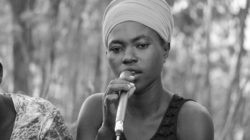After class on a Monday afternoon, rather than rushing away from school grounds, a group of students at bussled into the conference room at Lycée de Kigali. Dressed in white shirts and khaki shirts and pants, 17 girls and boys – members of their school’s Never Again Rwanda (NAR) club – were eager to start up thier monthly youth peace dialogue.
Dozens of students in the districts of Gasabo and Huye are now conducting monthly youth peace dialogues are part of a pilot program for NAR’s Societal Healing program, supported by Interpeace and Sida. The program aims to promote profound healing and reconciliation among Rwandans, with a particular emphasis on youth. The youth dialogue spaces are intended as places where young people can peacefully manage diversity and solve conflicts, to develop critical thinking and to promote healing, transformation and collaboration.
The theme of the dialogue for the Lycée de Kigali club was: “How can we peacefully impact our society? ” The discussion centered around how youth in schools could peacefully cohabitate despite their differences.
According to some students, peaceful cohabitation occurs when every community member is able to exchange his or her thoughts and views freely with his neighbor. They referred to this process as social cohesion – something that takes time, and is developed in spaces like their very own NAR club.
One club member noted that reconciliation is also an important aspect of peaceful cohabitation: “The time you spend with someone is very important in the reconciliation process; this enables you to build trust and a stronger relationship.”
Other students highlighted some societal issues that they felt require more attention from their community at large, and recommended that such issues be identified and actively addressed. “We should not only educate youth about peacebuilding but our parents and community members as well,” one participant said.
The discussions went on with students suggesting that they could use the youth peace dialogue as a place to talk about issues that they do not feel comfortable bringing up in their families. “This is a nice platform which should be used as a place to discuss sensitive issues that are sometimes considered taboo in our families,” a student said, adding that they could use the space to come up with strategies for dealing with peacebuilding issues in families, such as how to deal with violence in the home, or mental health issues that exist in some families.
We look forward to watching this youth dialogue club grow as we support them to develop their own solutions to the challenges to peace that they face – whether it’s in their own homes, at their school or in their community at large.


